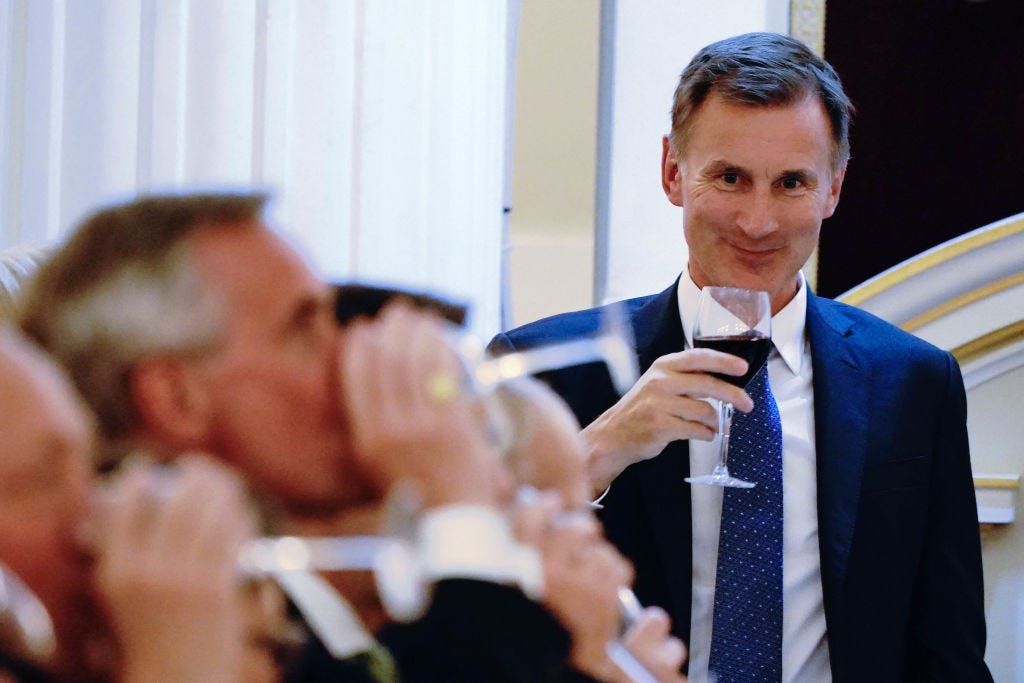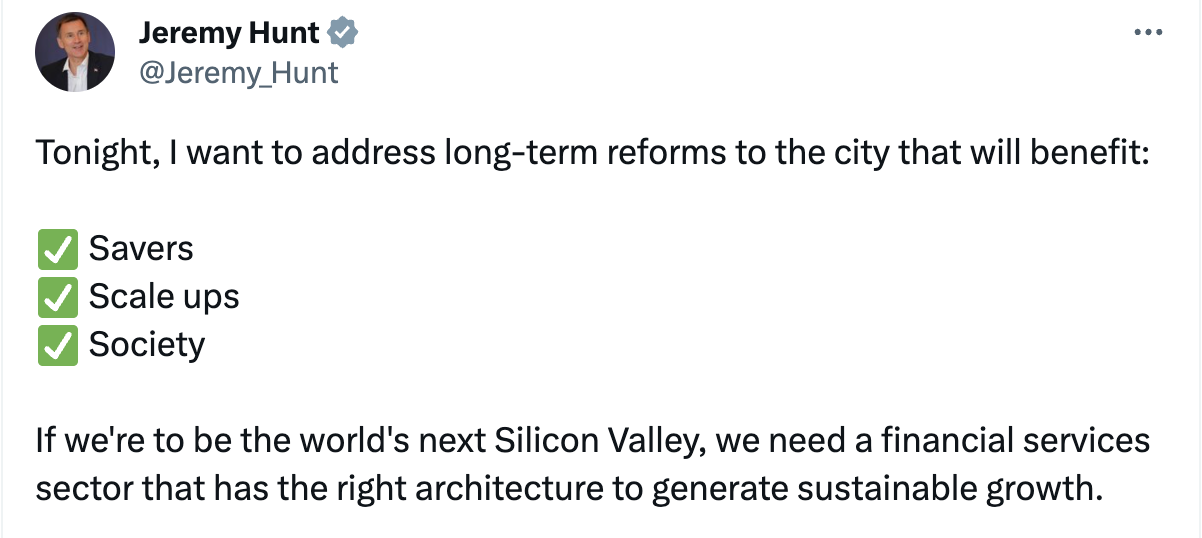Hello everyone and welcome to the latest Off to Lunch…
It’s the day after the night before, a night when Jeremy Hunt, the chancellor, laid out long-awaited proposals to get more money into promising businesses in the UK…
Laying out the reasons that his proposals are needed, Hunt said:
“We want to be the world’s next Silicon Valley and a science superpower, embracing new technologies like AI in a way that brings together the skills of our financiers, entrepreneurs and scientists to make our country a force for good in the world.
“That means making sure our financial services sector, traditionally so nimble and agile, has the right architecture to provide the best possible security for investors as well as capital for businesses, and the best talent right here in the UK to make that happen.”
These were the key proposals in his speech:
A voluntary pledge by nine of the UK’s biggest pension fund providers to commit at least 5 per cent of the default funds for their defined contribution pension schemes into unlisted assets by 2030. These unlisted assets include start-ups and other promising businesses which are yet to list on the stock market. At present about 0.5 per cent of pension funds is invested in unlisted assets, compared to more than 5 per cent in Australia. “Currently we have a perverse situation in which UK institutional investors are not investing as much in UK high-growth companies as their international counterparts,” Hunt said. “At the same time on their current trajectory, some defined contribution schemes may not provide the returns their pension fund holders expect or need.” The pension fund managers that have signed up include Aviva, Legal & General, Phoenix and M&G. If all of the defined contribution schemes in the UK sign-up then that would be £50 billion of funding for unlisted assets
A review of whether local authority pension schemes could double their investment in unlisted assets to 10 per cent of their assets. This could unlock another £25 billion of investment by 2030
The Pension Protection Fund may get the power to take on under-performing pension schemes to boost “productive investment”. At present, the PPF takes on the pension funds of collapsed businesses
A new permanent superfund regulatory regime that could allow the UK to bundle pension funds into bigger schemes like those in Australia and Canada, which invest around the world
The creation of a new platform to distribute research on listed companies which would be funded by banks, other City businesses and potentially taxpayers. This platform could improve the information available about listed companies and encourage retailer investors to buy more shares
The establishment of a new “intermittent trading venue” where private companies will be able to sell their shares to raise funds without fully listing on the stock market
A new review of the future of payments - such as the role of mobile payments and digital transactions - led by former Nationwide chief executive Joe Garner
You can read Hunt’s speech in full here
The reaction to the proposals has broadly been positive although there has been criticism of Hunt for downplaying the risks. The chancellor said that if pension funds invest more in unlisted assets it could boost the size of people’s pension pots by up to 12 per cent over their career or £1,000-a-year more in retirement. In his column for The Times, Patrick Hosking said of this claim:
The chancellor’s announcement that his reforms ‘will increase a typical earner’s pension pot by 12 per cent over the course of a career’ would be vetoed by the Financial Conduct Authority instantly. No regulated firm would dare to claim such dazzling, wealth-boosting powers.
You can read that column here
The view of the Financial Times’s editorial board is that the proposals are “pragmatic but not bold”. The FT noted that many of the reforms are only “a series of consultations ahead of potential policy measures in the Autumn Statement”. This includes the review of local authority pensions and the role of the PPF. The FT added:
There is a limit to how much Britain’s pension market alone can deliver the economic growth the country needs. Pension funds’ primary purpose is to deliver for savers, and they are also a significant buyer of the government’s debt. Channelling pensions towards supporting Britain’s economic growth is not straightforward.
You can read the FT column here
In The Telegraph, Ben Wright adds:
To be fair, the broad thrust of Hunt’s proposals – working with, rather than against, the financial services industry and fine-tuning regulation to release capital for fast-growing companies – is broadly correct. But the ambition appears pretty modest given the scale of the challenge.
You can find that piece here
Other stories that matter…
1. More tricky news on inflation. The latest data on employment and pay from the Office for National Statistics shows that average pay excluding bonuses rose 7.3 per cent year-on-year in the three months to the end of May. This is the highest growth on record, ahead of the 7.1 per cent forecast by economists and up from the 7.2 per cent growth reported last month. In his Mansion House speech last night, Andrew Bailey, governor of the Bank of England, said: “Both price and wage increases at current rates are not consistent with the inflation target.”
As a consequence of this data, the yield on gilts has risen again today and the pound has gone above $1.29. This is because financial markets think the data increases the likelihood of more interest rate rises. This is not good news for mortgage-holders. According to Moneyfacts the average rate on a two-year fixed rate mortgage is now 6.66 per cent, up from 6.63 yesterday, while the average rate on a five-year mortgage is 6.17 per cent, up from 6.13 per cent. These are the highest rates since 2008.
Despite all this, it is important to point out that wages are still growing by less than prices, meaning households are getting squeezed. Pay fell by 0.8 per cent year-on-year when you take inflation into account. The ONS data also shows that the unemployment rate in the UK has risen from 3.8 per cent to 4 per cent.
You can find the ONS report in full here
2. Pennon Group, the FTSE 250 company which owns South West Water, is to spend £85 million on building solar farms in Aberdeenshire, Buckinghamshire and Cumbria. Announcement here. Sticking with energy, Centrica, the owner of British Gas, has agreed an $8 billion deal to import natural gas from the Delfin Deepwater Port off the coast of Louisiana, US. The deal will start in 2027 and involves enough gas to heat 5 per cent of UK homes for 15 years. Announcement here
3. A start-up that repurposes electric vehicle batteries into mobile energy storage units has raised £900,000 of funding. Allye has won backing from venture capital firms Elbow Beach Capital and Alpha Future Funds. Full story here and more on Allye here
4. A new report by the OECD (the Organisation for Economic Co-operation and Development) says that artificial intelligence means that advanced economies “may be on the verge of a technological revolution that could fundamentally change the workplace”. However, it also says there are “significant risks that need to be urgently addressed”. You can find the OECD report here. Meanwhile, the Faster, Please! newsletter (of which Rishi Sunak is a reader) has done an interesting piece on how Goldman Sachs is assessing the hype around AI technology. The US investment bank has published research headlined “Generative AI: hype, or truly transformative?” Faster, Please! says that Goldman thinks that AI is not just another hype cycle that will result in deep disillusionment and bust. It says: “The current AI boom is being driven by established and influential tech companies rather than startups as was the case during the 1990s internet bubble. That difference reduces the risk of the boom fading away or taking a long time to gain momentum, according to GS.” You can read more here
5. The US investor Howard Marks has written about the five occasions in his career that he has called the bottom or top of the market correctly, providing a fascinating insight into his thinking. Only making five calls rather than 50 was the key, he writes. On the bursting of the dotcom bubble in 2000, Marks says: “The lure of easy profits, the willingness to leave one’s day job to cash in, the ability to invest blithely in money-losing companies whose business models one can’t explain – all these felt like themes that had rhymed over the course of financial history, leading to bubbles and their painful bursting. And all of them were visible in investor behaviour as 1999 came to an end.” You can read his memo in full here
And finally…
I wanted to share some great sporting photography and videography from the weekend…
Firstly, check out this image from sports photographer James Rhodes of the men’s 100 metres at the UK Athletics Championships in Manchester at the weekend. A very British image…
Secondly, watch this short video of England players celebrating their victory over Spain at the weekend to win the European Under-21 Championship. A remarkable piece of camera work…
Thanks for reading. If you enjoy Off to Lunch then please share it with others and spread the word. If this newsletter was shared with you then please sign-up below to become a member, get Off to Lunch sent directly to your inbox, and contribute to the work of Off to Lunch
Best
Graham








